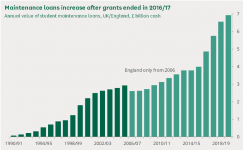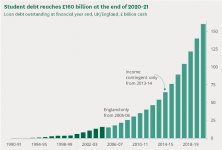JM14
Well-known member
Another attack on the young from this government, they will do anything to avoid their pensioner base
However you try to spin it, it’s a tax on all graduates who wouldn’t be able to pay off their student loans under the current rules and affects the poorest of them more than anyone else.Do you know anyone who graduates from University and subsequently never, for the entire duration of their working life, goes into a job that pays more than £23k pa?
No, me neither. And if they don’t then they probably shouldn’t have gone to university in the first place
No, but quite a few grad schemes will start on less than that.Do you know anyone who graduates from University and subsequently never, for the entire duration of their working life, goes into a job that pays more than £23k pa?
No, me neither. And if they don’t then they probably shouldn’t have gone to university in the first place
The majority won’t ever pay them off, that’s accepted. But this will just make it even more difficult for people from poor backgrounds to attend uniWith the current system, to pay off the student loans in full, before they are written off, you need your first post graduate job to start at 55k.
I wonder what percentage of graduates start at that figure.
Can you explain that - are you saying because less people will be able to default on a loan and pay it back it’s a tax?However you try to spin it, it’s a tax on all graduates who wouldn’t be able to pay off their student loans under the current rules and affects the poorest of them more than anyone else.
Bit judgemental but ok.Do you know anyone who graduates from University and subsequently never, for the entire duration of their working life, goes into a job that pays more than £23k pa?
No, me neither. And if they don’t then they probably shouldn’t have gone to university in the first place
Rubbish.Do you know anyone who graduates from University and subsequently never, for the entire duration of their working life, goes into a job that pays more than £23k pa?
No, me neither. And if they don’t then they probably shouldn’t have gone to university in the first place
Roofie has answered that question perfectly. Forcing loans on people who would otherwise never qualify for credit of that size is both unnecessary and immoral. It only puts barriers in the way of the poorest to prevent them from bridging the class divide. British businesses benefit greatly from the graduates we produce. They should be picking up the tab for educating and training them.Can you explain that - are you saying because less people will be able to default on a loan and pay it back it’s a tax?
The majority won’t ever pay them off, that’s accepted. But this will just make it even more difficult for people from poor backgrounds to attend uni
If the threshold for starting to pay the loan back is reduced any further its going to be crippling for some people, I have no problem with paying it back once its affordable (fees shouldnt be anywhere near that high but thats another discussion) but for most you come out of uni for the first few years with no money and a fairly poorly paid grad job (if youre lucky) and likely a min of £800/1k monthly rental costs before anything else.I'm not sure how I stand on this topic, so don't come after me, I just want some things clearing up.....
Why? The debt only gets paid back once they're "no longer poor", in the reality of the world, although in the UK, 23k and 29k is not exactly well off. Since that lower earnings limit came in, inflation and wages have ultimately made that cap lower, so it should have been going higher if anything, this is a massive change.
But, the cap is changing from 9k to 7.5k, so a 4 year course is now 30k, rather than 36k, so it's a small change for most, unless they're on a cheap course.
The majority won’t ever pay them off, that’s accepted. But this will just make it even more difficult for people from poor backgrounds to attend uni
Problem is for almost every decent job that isnt manual, you are required to have a degree which is just crazy. Change that to more on the job training and relevant qualifications and it makes things far better.The system needs changing, and what is paid, somehow needs to be current and future means-tested, not just future means-tested, but bright people from poorer backgrounds should still get the opportunities that rich idiots do.
If uni is being funded though, then some more manual trades should be able to get their training or tools paid for, with the same earnings caps, for like plumbing, electrical courses, site passes, HGV's etc. It's unfair that these guys have to pay for their own tools and courses, and fund the education for people who could likely ultimately end up their bosses, on a lot more money, or effectively just ******* it up the wall, although the latter seemingly seems to happen less and less. In our sports clubs, the uni lot are nowhere near as bad on the booze as my age group was!
I think what most have a gripe with is people doing an effectively pointless degree for 4+ years, that has low job prospects and not in an area of growth, so they end up racking up a load of debt and then opting for a simpler or less testing line of work.
For me, we should prioritise funding towards trades in need, or those who would have very little chance of not reaching the earnings caps.
I also don't think we should allow people who clearly are not attending or continually failing to carry on with their courses, especially if they're in areas with low job prospects. If it's being funded by the people, it needs to benefit the people so they get a good ROI.
As a side point, as I saw a recent study from the US, and once a few variables were catered for, the quality of college/ uni had very little bearing on the expected total earnings over a career, which seemed surprising.
If the threshold for starting to pay the loan back is reduced any further its going to be crippling for some people, I have no problem with paying it back once its affordable (fees shouldnt be anywhere near that high but thats another discussion) but for most you come out of uni for the first few years with no money and a fairly poorly paid grad job (if youre lucky) and likely a min of £800/1k monthly rental costs before anything else.
Those coming into this from rich backgrounds will have parents to bail them out, but its already enough to put poorer students off and thats without then having to start paying back the student loan earlier.
Problem is for almost every decent job that isnt manual, you are required to have a degree which is just crazy. Change that to more on the job training and relevant qualifications and it makes things far better.
I did what most would consider a pointless degree, and have moved into a line of work which isnt related to the degree in the slightest, yet it was still required for the job, without it the earning potential and potential to progress would be seriously limited. And that seems fairly representative across the sector. I completely agree with your point and I think its the most pointless system you can have, but thats why you end up with so many doing what seems like pointless degrees

 commonslibrary.parliament.uk
commonslibrary.parliament.uk


Maybe they're just looking at it like it's a fair investment, and that getting something back is better than nothing? Basically, an accepted money pit, as they get the cash back from other areas like tax or whatever?Just to add some meat to the bones and a few facts to the debate.
Here are the Governments Official Figures - direct from Hansard about the total owed.
It is laughable unless you are the one in debt.
Its an admission by Government that the system is unworkable, unrealistic and totally unsuitable for the 21st Century.
---------------------------------------------------------------------------------------------------------------

Student loan statistics - House of Commons Library
Student loans are the main method of direct government support for higher education students. More than £17 billion is loaned to students each year. The value of outstanding loans at the end of March 2021 reached £160 billion. The Government forecasts the value of outstanding loans to be around...commonslibrary.parliament.uk
Student loans are the main method of direct government support for higher education students. Money is loaned to students at a subsidised rate to help towards their maintenance costs and to cover the cost of tuition fees.
Currently more than £17 billion is loaned to around 1.3 million students in England each year. The value of outstanding loans at the end of March 2021 reached £141 billion. The Government forecasts the value of outstanding loans to be around £560 billion (2019‑20 prices) by the middle of this century. The average debt among the cohort of borrowers who finished their courses in 2020 was £45,000.
The Government expects that 25% of current full-time undergraduates who take out loans will repay them in full.
?
